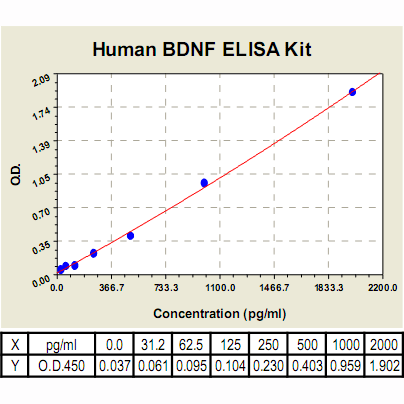Product Sheet CL0307
Description
BACKGROUND Trk (neurotrophin) receptors are single transmembrane catalytic receptors with intracellular tyrosine kinase activity. Trk receptors are coupled to the Ras, Cdc42/Rac/RhoG, MAPK, PI 3-K and PLCgamma signaling pathways. There are four members of the Trk family; TrkA, TrkB and TrkC and a related p75NTR receptor. p75NTR lacks tyrosine kinase activity and signals via NF-kappaB activation. Each family member binds different neurotrophins with varying affinities. TrkA potently binds nerve growth factor (NGF) and is involved in differentiation and survival of neurons and in control of gene expression of enzymes involved in neurotransmitter synthesis. TrkB has highest affinity for brain-derived neurotrophic factor (BDNF) and is involved in neuronal plasticity, longterm potentiation and apoptosis of CNS neurons. TrkC is activated by neurotrophin-3 (NT-3) and is found on proprioceptive sensory neurons. p75NTR binds neurotrophin precursors with high affinity and retains low affinity to the mature cleaved forms.1 TrkA was originally identified as an oncogene as it is commonly mutated in cancers, particularly colon and thyroid carcinomas.
BDNF is a member of the nerve growth factor family. It is induced by cortical neurons, and is necessary for survival of striatal neurons in the brain. Expression of this gene is reduced in both Alzheimer\'s and Huntington disease patients.2 BDNF may play a role in the regulation of stress response and in the biology of mood disorders.3 Multiple transcript variants encoding distinct isoforms have been described for this gene.
BDNF is a member of the nerve growth factor family. It is induced by cortical neurons, and is necessary for survival of striatal neurons in the brain. Expression of this gene is reduced in both Alzheimer\'s and Huntington disease patients.2 BDNF may play a role in the regulation of stress response and in the biology of mood disorders.3 Multiple transcript variants encoding distinct isoforms have been described for this gene.
REFERENCES
1. Patapoutian, A. & Reichardt, L.F. : Curr. Opin. Neurobiol. 11:272-80, 2001
2. Ciammola, A. et al: Am. J. Med. Genet. Pt.B 144B:574-7, 2007
3. Duman, R.S. & Monteggia, L.M. : Biol. Psych. 59:1116-27, 2006
2. Ciammola, A. et al: Am. J. Med. Genet. Pt.B 144B:574-7, 2007
3. Duman, R.S. & Monteggia, L.M. : Biol. Psych. 59:1116-27, 2006
Products are for research use only. They are not intended for human, animal, or diagnostic applications.
Details
Cat.No.: | CL0307 |
Target Protein Species: | Human |
Range: | 31.2 pg/ml – 2000 pg/ml |
Specificity: | No detectable cross-reactivity with other cytokines |
Storage: | Store at 4°C. Use within 6 months. |
ELISA Kits are based on standard sandwich enzyme-linked immunosorbent assay technology. Freshly prepared standards, samples, and solutions are recommended for best results.
Products
| Product | Size | CAT.# | Price | Quantity |
|---|---|---|---|---|
| Human BDNF ELISA Kit: Human Brain Derived Neurotrophic Factor ELISA Kit | Size: 96 Wells | CAT.#: CL0307 | Price: $484.00 |
Resources/Documents
Publications
2012
Hu, J., L. Shen, R. Wang, Q, Wang, C. Zhang, J. Xi, S. Ma, J. Zhou, and H. Lu. 2012. Effects of Olig2-Overexpressing Neural Stem Cells and Myelin Basic Protein-Activated T Cells on Recovery from Spinal Cord Injury. Neurotherapeutics, 9:422-445.

